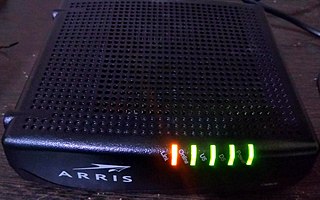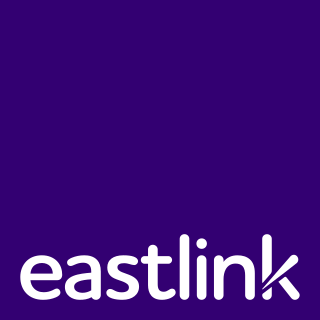Present-day telecommunications in Canada include telephone, radio, television, and internet usage. In the past, telecommunications included telegraphy available through Canadian Pacific and Canadian National.
Telecommunications in Ireland operate in a regulated competitive market that provides customers with a wide array of advanced digital services. This article explores Ireland's telecommunications infrastructure including: fixed and mobile networks, The voice, data and Internet services, cable television, developments in next-generation networks and broadcast networks for radio and television.
In telecommunications, a customer-premises equipment or customer-provided equipment (CPE) is any terminal and associated equipment located at a subscriber's premises and connected with a carrier's telecommunication circuit at the demarcation point ("demarc"). The demarc is a point established in a building or complex to separate customer equipment from the equipment located in either the distribution infrastructure or central office of the communications service provider.

A cable modem is a type of network bridge that provides bi-directional data communication via radio frequency channels on a hybrid fibre-coaxial (HFC), radio frequency over glass (RFoG) and coaxial cable infrastructure. Cable modems are primarily used to deliver broadband Internet access in the form of cable Internet, taking advantage of the high bandwidth of a HFC and RFoG network. They are commonly deployed in the Americas, Asia, Australia, and Europe.

Multichannel multipoint distribution service (MMDS), formerly known as broadband radio service (BRS) and also known as wireless cable, is a wireless telecommunications technology, used for general-purpose broadband networking or, more commonly, as an alternative method of cable television programming reception.

Internet access is a facility or service that provides connectivity for a computer, a computer network, or other network device to the Internet, and for individuals or organizations to access or use applications such as email and the World Wide Web. Internet access is offered for sale by an international hierarchy of Internet service providers (ISPs) using various networking technologies. At the retail level, many organizations, including municipal entities, also provide cost-free access to the general public.

Internet Protocol television (IPTV) is the delivery of television content over Internet Protocol (IP) networks. This is in contrast to delivery through traditional terrestrial, satellite, and cable television formats. Unlike downloaded media, IPTV offers the ability to stream the source media continuously. As a result, a client media player can begin playing the content almost immediately. This is known as streaming media.

GCI Communication Corp (GCI) is a telecommunications corporation operating in Alaska. Through its own facilities and agreements with other providers, GCI provides cable television service, Internet access, wireline (networking), and cellular telephone service. It is a subsidiary of Colorado-based company Liberty Broadband, a company affiliated with Liberty Media that also owns a 26% interest in Charter Communications, having been originally acquired by Liberty in 2015.
Saskatchewan Telecommunications Holding Corporation, operating as SaskTel, is a Canadian crown-owned telecommunications firm based in the province of Saskatchewan. Owned by the provincial government, it provides wireline and wireless communications services, including landline telephone, mobile networks, broadband internet, IPTV, and security services. Through a subsidiary, SaskTel International, the company has also worked on telecom infrastructure projects in countries such as Argentina and the Bahamas, as well as being the lead implementation company for the communication and control systems of the Channel Tunnel between England and France.

Bragg Communications Inc., doing business as Eastlink, is a Canadian cable television and telecommunications company. The privately held company was founded in Nova Scotia in 1969 by the Bragg family, and has grown since through the amalgamation of several telecommunications companies.

In the field of telecommunications, the concept of triple play service refers to the provision of three essential services — high-speed broadband Internet access, television, and latency-sensitive telephone services — all delivered over a single broadband connection. This approach emphasizes the convergence of multiple services by a single supplier, aiming to enhance user convenience and streamline service delivery.

i-Cable Communications Limited is a Hong Kong telecommunications company owned by Forever Top (Asia) Limited, which acquired the company from The Wharf Group in 2017. Founded in 1999, the company provides broadband internet and pay-TV services. i-Cable also develops its fibre coaxial network.
In telecommunications, cable Internet access, shortened to cable Internet, is a form of broadband internet access which uses the same infrastructure as cable television. Like digital subscriber line and fiber to the premises services, cable Internet access provides network edge connectivity from the Internet service provider to an end user. It is integrated into the cable television infrastructure analogously to DSL which uses the existing telephone network. Cable TV networks and telecommunications networks are the two predominant forms of residential Internet access. Recently, both have seen increased competition from fiber deployments, wireless, mobile networks and satellite internet access.

CJTR-FM is a Canadian radio station, airing at 91.3 FM in Regina, Saskatchewan. The station airs a community radio format, featuring a variety of musical styles and talk shows. It is operated by Radius Communications, a non-profit corporation that began fundraising in 1996 and got the station on the air in 2001.

Canada ranks as the 21st in the world for Internet usage with 31.77 million users as of July 2016 (est), making up 89.8% of the population. According to Harvard researchers, Canada has some of the lowest internet standards among OECD countries, as a result of high costs and slow internet speeds.

G4 was a Canadian English-language specialty television channel owned by Rogers Media. The name was licensed from NBCUniversal, whose parent company Comcast formerly owned a minority stake in the channel. Based on the U.S subscription networks TechTV and G4, the channel was originally focused on technology-themed programming.
SES Broadband is a two-way satellite broadband Internet service available across Europe, which launched in March 2007, and uses the Astra series of geostationary satellites.
Hargray Communications is a telecommunications provider based on Hilton Head Island, South Carolina, United States. It operates internet throughout the Lowcountry region of South Carolina and the Savannah region of Georgia. Hargray has a monopoly on parts of the Lowcountry offering cable television, broadband Internet, and landline services. Hargray formerly resold cellular phone service through Cricket.
Full Channel, Inc. was an American pay television and telecommunications provider set in Rhode Island. At the time of its acquisition by CountryWide Broadband it was the third-largest cable television and Internet service provider in the state. Its wired communications network was available to the approximately 50,000 residents of Bristol County, Rhode Island. Full Channel's main office was at 57 Everett Street in Warren, Rhode Island, U.S.
Distributel is a brand of Bell Canada headquartered in Toronto, Ontario, founded in 1988 and offering Canadians long distance phone service. Distributel now offers a wide range of high speed Internet plans in Ontario, Quebec, British Columbia and Alberta as well as VoIP Digital Home Phone service across Canada. Distributel also provides IPTV in all major markets in Ontario and Quebec.











